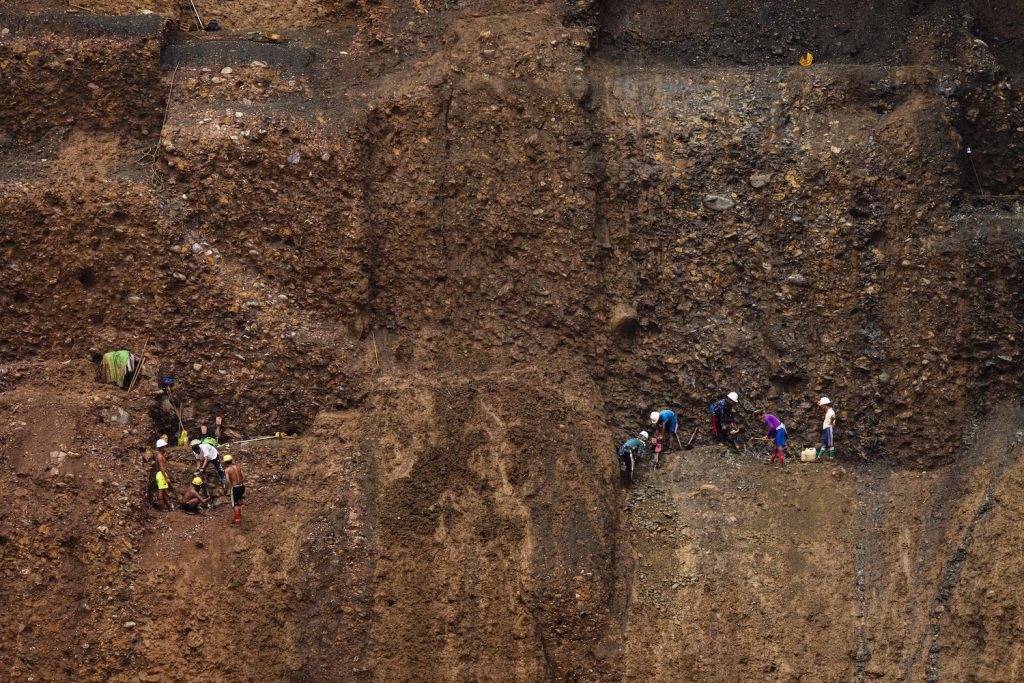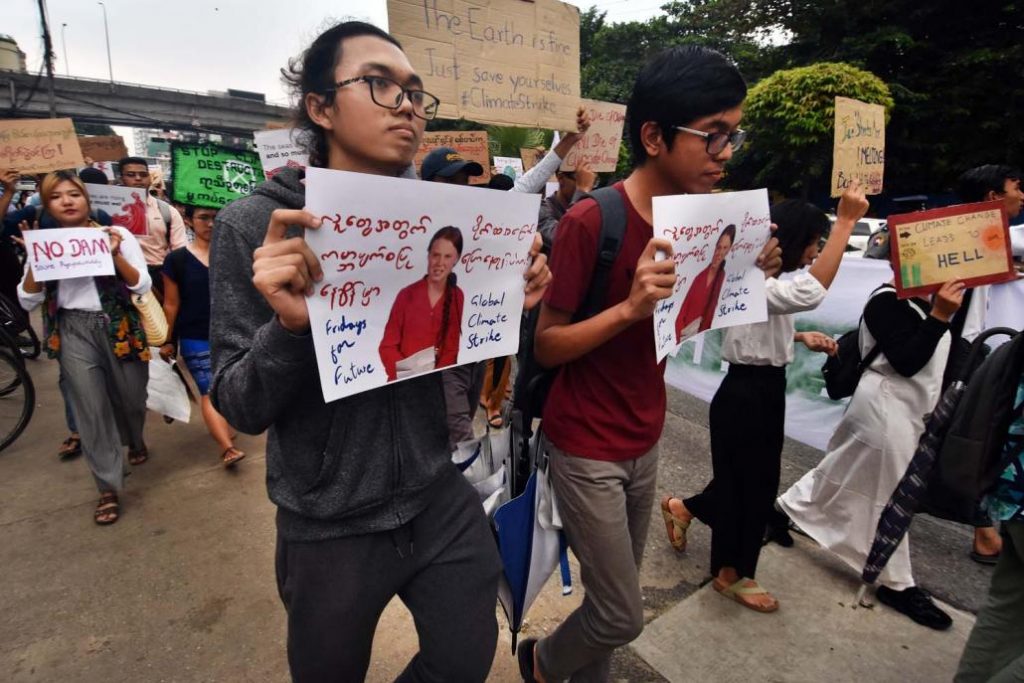There are already signs that the coup has prompted an increase in illegal mining and logging, and regime economic policies are set to compound the environmental destruction at a time when activists and communities are unable to push back.
By FRONTIER
Within months of the February 2021 coup, there were already signs that military rule could have disastrous consequences for Myanmar’s natural environment.
From far northern Kachin State, reports began to emerge that illegal rare earth mining in remote territory controlled by a military-affiliated Border Guard Force had begun to ramp up. The region is one of the world’s major sources of several types of heavy rare earths, which are exported over the border to China for use in everything from electric vehicles to smartphones.
But the mining process is environmentally damaging; it involves toxic chemicals that are pumped through the mountains and often seep into waterways. As one miner told Frontier last year, “In the areas we worked on the mountains, there’s nothing left, not even a small bird. Anything that drinks the liquid we put in the mountains will die. Nothing can live there.”
For Myanmar’s environmentalists, news of an increase in illegal mining was not surprising. In an effort to make a quick buck, the previous military regime had overseen the pillage of the country’s natural assets on a vast scale, and history seemed to be repeating. Although the civilian government struggled to significantly improve the situation, it had at least acted as a handbrake on environmental destruction – and now it was gone. The conflict engulfing Myanmar meant that bad actors could quickly move in, usually with tacit approval from military authorities.
“Under the civilian government, if we complained about illegal rare earth mining, officials immediately visited and investigated,” Ja Hkaw Lu of the Transparency and Accountability Network Kachin State told The Irrawaddy last year. “[Illegal miners] stayed away but now it is totally out of control.”
But environmental experts say environmental damage since the coup is not just limited to rare earth mining in Kachin State. Satellite imagery showed an acceleration in logging in a country that had already lost much of its pristine forest in recent decades, while watchdog Global Witness has reported a “sharp rise” in illegal mining at Hpakant in Kachin State, which is famous for its jade.
Jack Jenkins Hill, an environmental researcher who has lived in Myanmar for more than seven years, working with civil society organisations on land and forest tenure issues in Tanintharyi Region and other areas, said the coup had “stopped all progress” on environmental conservation, and logging and illegal mining had increased “dramatically” as a result of the military takeover.
“The military [is] looking to resources that can quickly be turned into profits to fight their illegal war,” he said.

Destructive policies
The coup has led to environmental damage through illegal mining and logging, but the regime’s economic policies are also a sign of further problems to come.
Shortly after the coup, regime leader Senior General Min Aung Hlaing began trumpeting plans for palm oil plantations and hydropower dams in environmentally sensitive locations, such as on the Thanlwin (Salween) River – the last major undammed river in Southeast Asia – and in heavily forested Tanintharyi Region.
Some of these plans have been delayed due to conflict, such as the Hatgyi mega-dam in Kayin State. But in areas of the country where conflict has subsided, the regime is attempting to move forward with development projects that could spell environmental trouble for locals.
In Rakhine State, for example, the junta has designated the Kyaukphyu deep-sea port and the special economic zone a “priority project” from among 33 that were agreed during Chinese President Xi Jinping’s visit in January 2020.
The project is a strategic priority for China so it can access the Indian Ocean, and was initiated by former president U Thein Sein and then renegotiated under Daw Aung San Suu Kyi’s National League for Democracy administration.
Chinese state-owned firm CITIC has continued to press ahead with the project since the coup, despite calls by protesters and the parallel National Unity Government to suspend planned investments. In its investment guidelines, the NUG has said existing investments must not “lend legitimacy to the junta nor fuel their ability to oppress the people of Myanmar.”
With the help of Hatch, a Canadian firm acting as the project management consultant, CITIC hired Myanmar firm Myanmar Survey Research as the consultant on an environmental and social impact assessment (ESIA) for the proposed deep-sea port and SEZ on February 10, the Chinese company said.
A source familiar with the bidding for the consultancy contract said companies with more experience in similar port projects had dropped out of the running last year, prior to MSR being selected.
Experts say the project is on such a large scale and has such significant implications for the region that an ESIA is not comprehensive enough, and the developer should be required to conduct a broader strategic environmental assessment (SEA).
“The ESIA that is now envisaged is much narrower in scope,” said Ms Laetitia van den Assum, a former Dutch ambassador to Myanmar who was a member of the Advisory Commission on Rakhine State, which recommended an SEA in its final report in 2017.
But she also questioned the ability and appetite of the regime to enforce environmental regulations and community rights in a time of crisis.
“Frankly, I do not understand how an ESIA, let alone a strategic environment assessment, can be considered while Rakhine state and the country are in an existential crisis.”

Environmental defenders at risk
Under previous civilian governments, environmentalists and activists were generally able to speak out against environmentally destructive practices. Thein Sein’s decision to suspend the Myitsone hydropower dam in September 2011 was an important step forward, reflecting a new willingness to listen to public concerns and to consider the environmental impacts of economic projects.
But since the coup, environmental defenders have found themselves targeted by the regime as part of a broader crackdown on dissent.
London-based environmental watchdog Environmental Investigation Agency said in a report last April that the work of civil society towards transparency in the forest sector have been “destroyed overnight”, with on-the-ground monitoring of illegal logging and illicit mining now “almost impossible” due to the junta’s violence.
In June 2021, well-known environmental defender Ko Man Zar Myay Mon was shot by soldiers and detained in Sagaing Region’s Chaung-U Township, where he had been leading protests against the military regime.
Three months later, an environmental and democracy activist, Ko Kyaw Min Htut, was arrested in Sagaing Region under section 50 of the Counter-Terrorism Law for allegedly funding groups designated by the military junta as terrorists. A day earlier, his wife and two-year-old son were detained.
Man Zar Myay Mon and Kyaw Min Htut were active members of environmental groups and civil society, including the Myanmar Alliance for Transparency and Accountability (MATA), a network of over 400 CSOs nationwide, and the Myanmar arm of the Extractive Industries Transparency Initiative (EITI).
The two are among at least 18 environmental activists who have been arrested across Myanmar since the coup, said Jenkins Hill, the environmental researcher. More than 13,000 people arrested by the junta in all since the coup, according to data from rights group Assistance Association for Political Prisoners.
“Communities are much more afraid of speaking out or publicly asserting control over their territories and biodiversity for fear of reprisals from the junta,” Jenkins Hill said. Pointing to the number of activists arrested, he accused the regime of “perpetrating a war against the environment and those who defend it”.
“The reversion to totalitarianism and authoritarianism, as well as a civil war which needs quick money from resources, is a toxic mix – there are no longer any platforms for communities and civil society to land and resource destruction from extractive and agribusiness projects.”
A Karen environmentalist who requested anonymity for security reasons said the coup had made it difficult to carry out environmental activities for a range of reasons. Aside from escalating conflict in many parts of the country and increased security risks, environmental networks have been disrupted because members have been forced to flee to “liberated areas” under the control of ethnic armed groups.
“There are difficulties in travelling due to [fighting] and it is dangerous to meet with the local community, [as it] will result in increasing security risks for them and us,” said the Karen environmentalist.
“Our network partners, which include Kachin, Karen, Kayah, Mon and Karenni [environmentalists], are busy with their own matters – some of them have joined the revolutionary cause and some are in the liberated areas. So monitoring across the whole of Myanmar is extremely weak right now.”
The environmentalist said they have instead focused on activities in areas under ethnic armed group control, pointing to the recent recognition of five kaw (Karen customary lands) in two Karen National Union districts. Kaw typically have a number of different land uses, such as agricultural lands, household residences, sacred religious areas, protected forests and biodiversity.
This story was produced as part of a grant from UKaid to support climate change and environment-related journalism.







